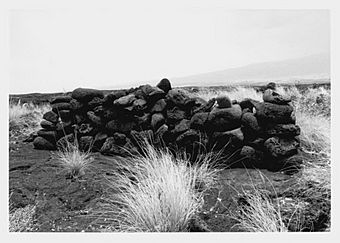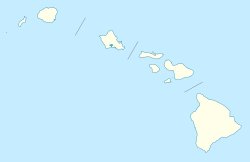Keahole Point facts for kids
Quick facts for kids |
|
|
Kalaoa Permanent House Site 10,205
|
|

An ancient house ruin
|
|
| Location | Keāhole Point |
|---|---|
| Area | less than one acre |
| Built | 1400-1800 |
| Architectural style | Ancient Hawaiian |
| NRHP reference No. | 92001552 |
| Added to NRHP | November 21, 1992 |
Keāhole Point is the westernmost tip of the Big Island of Hawaii. It's a significant spot for both nature and history. The name Ke ʻāhole comes from the ʻāhole fish, which were commonly found in the nearby waters. This fish is also known as the Reticulated flagtail.
Contents
Keāhole Point: Hawaii's Western Edge
This area is home to the Kona International Airport. The airport moved here in 1970. Before that, a smaller airstrip was located directly north of Kailua-Kona. That old airstrip is now a fun place called the Old Kona Airport State Recreation Area.
Exploring the Area
Keāhole Point is more than just an airport location. It has unique natural features and important scientific facilities.
Natural Energy Lab
Between the airport and the ocean, you'll find the Natural Energy Laboratory of Hawaii. This lab uses the ocean's deep, cold water and warm surface water to create energy. It's a special place for studying clean energy and aquaculture (farming seafood).
The Huʻehuʻe Lava Flow
Most of the land at Keāhole Point was created by a huge lava flow in 1801. This flow came from the Hualālai volcano. It's called the Huʻehuʻe lava flow. This amazing event pushed the shoreline out by about 1 mile. It added roughly 4 square kilometers (about 1.5 square miles) of new land to the island. The southern part of this point is sometimes called Kalihi Point.
Ancient Life at Kalaoa
The area around Keāhole Point has a long history. It was once part of an ancient Hawaiian community called Ahupuaʻa of Kalaoa. An ahupuaʻa was a traditional land division in Hawaii. It stretched from the mountains to the sea. Today, Kalaoa is still used as a census-designated place.
The Kalaoa House Site
One important historical spot here is the Kalaoa Permanent House Site. This site includes the remains of an ancient home. You can see a house platform, a walled area, and a pile of old items. These items include volcanic glass and seashells. These clues tell us about the people who lived here long ago.
A Glimpse into the Past
Archaeologists studied this site in 1975. They believe it was likely the home of an ordinary family. People probably lived here between the years 1500 and 1800. This means the site was used for about 300 years!
The Kalaoa Permanent House Site is very important. On January 14, 1989, it was added to Hawaii's state register of historic places. Later, on November 21, 1992, it was also added to the National Register of Historic Places. This makes it a protected site. Just south of this area is another place known as Oʻoma.
 | Shirley Ann Jackson |
 | Garett Morgan |
 | J. Ernest Wilkins Jr. |
 | Elijah McCoy |


